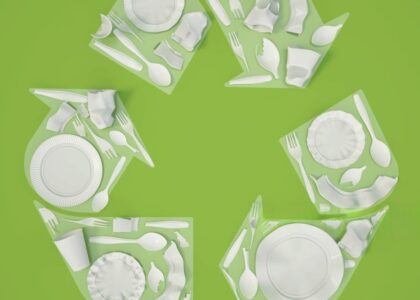The environmental impact of consumer goods is a growing concern as the global population continues to rise and consumption patterns increase. One of the most pressing issues is the waste generated by packaging, which often ends up in landfills or the ocean, contributing to pollution and environmental degradation. To combat this, companies and consumers are increasingly turning to sustainable packaging solutions. These innovative approaches, including biodegradable materials, reusable containers, and zero-waste packaging, are essential for reducing the environmental footprint of consumer goods.

Biodegradable Materials: A Step Toward Eco-Friendly Packaging
Biodegradable packaging materials are designed to break down naturally in the environment, minimizing waste and reducing pollution. Unlike traditional plastics, which can take hundreds of years to decompose, biodegradable materials such as polylactic acid (PLA) and bioplastics made from cornstarch or sugarcane break down more quickly when exposed to natural elements like sunlight, moisture, and microorganisms.
The adoption of biodegradable packaging has gained momentum in recent years as companies seek to reduce their environmental impact. For example, food and beverage companies are increasingly using compostable packaging made from plant-based materials, which can decompose in industrial composting facilities. This not only reduces the amount of waste sent to landfills but also helps lower greenhouse gas emissions associated with traditional plastic production.
Reusable Containers: Promoting a Circular Economy
Another effective approach to sustainable packaging is the use of reusable containers. By encouraging consumers to refill and reuse packaging, companies can significantly reduce the demand for single-use plastics and other disposable materials. This shift towards a circular economy—where products and materials are kept in use for as long as possible—can help decrease waste and conserve resources.
Reusable packaging is particularly popular in the food and beverage industry. For example, some grocery stores offer bulk sections where customers can fill their own containers with dry goods, such as grains, nuts, and spices. Similarly, beverage companies are introducing refillable bottles that consumers can return for cleaning and reuse, thereby reducing the need for new packaging. These initiatives not only reduce waste but also empower consumers to make more sustainable choices in their daily lives.
Zero-Waste Packaging: Eliminating Waste at the Source
Zero-waste packaging aims to eliminate waste by designing products and packaging that can be fully reused, recycled, or composted. This approach requires a comprehensive rethink of packaging design, materials, and supply chains to ensure that no waste is generated at any stage of the product’s lifecycle.
One innovative example of zero-waste packaging is edible packaging, which is made from food-grade materials that can be safely consumed. Edible packaging can be used for a variety of products, including snacks, beverages, and condiments, offering a waste-free alternative to traditional packaging. Additionally, companies are exploring the use of minimal or no packaging for certain products, reducing overall material usage and waste.
The Future of Sustainable Packaging
As consumers become more environmentally conscious, the demand for sustainable packaging solutions is likely to grow. Companies that adopt biodegradable materials, reusable containers, and zero-waste packaging not only contribute to environmental preservation but also position themselves as leaders in sustainability.
However, the transition to sustainable packaging is not without challenges. Companies must navigate issues such as cost, scalability, and consumer acceptance. Collaboration across industries and with governments will be crucial to overcoming these barriers and driving widespread adoption of sustainable packaging practices.
In conclusion, sustainable packaging represents a vital step towards reducing the environmental impact of consumer goods. By embracing innovative solutions such as biodegradable materials, reusable containers, and zero-waste packaging, companies and consumers can work together to create a more sustainable future, where waste is minimized, and resources are conserved.






